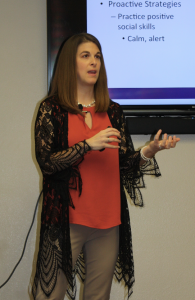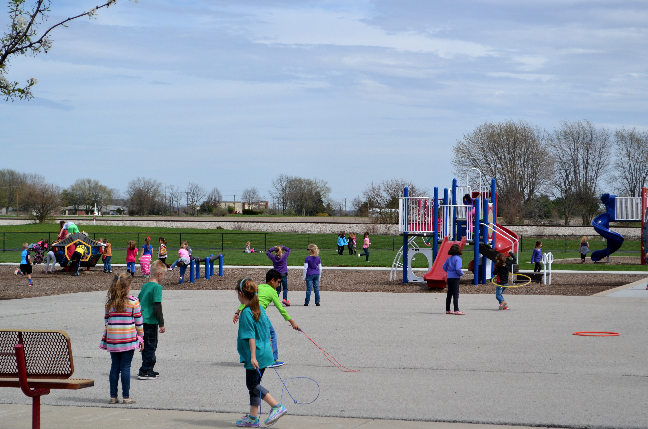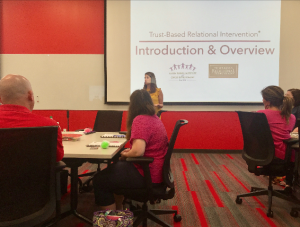How Center Grove Community Schools is Focusing on Relationships to Improve Students’ Futures
Writer / Jessica Hyde, Sugar Grove Elementary Principal
Photos provided by Center Grove Community Schools

 Have you ever found yourself in the midst of a squabble between children? It happens on school playgrounds, in classrooms and in our homes. In a traditional elementary school setting, when two students get in a fight at recess, they are sent to the principal’s office for a consequence, which typically results in losing recess for a week. The students may hear a 20-minute lecture on what they did wrong, be required to apologize and are then sent on their way. For the next five days, the students will exchange mean looks across the office while serving their time. Unfortunately, the likelihood that they will repeat this behavior is high.
Have you ever found yourself in the midst of a squabble between children? It happens on school playgrounds, in classrooms and in our homes. In a traditional elementary school setting, when two students get in a fight at recess, they are sent to the principal’s office for a consequence, which typically results in losing recess for a week. The students may hear a 20-minute lecture on what they did wrong, be required to apologize and are then sent on their way. For the next five days, the students will exchange mean looks across the office while serving their time. Unfortunately, the likelihood that they will repeat this behavior is high.
A New Approach to Discipline
This scenario plays out very differently in a school where Trust-Based Relational Intervention® (TBRI®) is at the forefront of behavioral instruction and intervention. The two students in conflict will be assigned to attend Nurture Group. In this strategic intervention, the students will learn to care for one another, build a healthier relationship and learn appropriate strategies for responding to difficult situations on the playground, while keeping their emotions regulated. These students will likely leave with a new respect for one another and a skill set that will help them avoid making the same mistakes in the future.
When implementing Nurture Groups with students who exhibited significant behavior issues at Pleasant Grove Elementary School last year, severe discipline issues that resulted in office referrals and physical removal from classrooms decreased by 67 percent. This powerful tool yielded better results than traditional discipline strategies previously utilized.
What is TBRI®?
“TBRI® is an attachment-based, trauma-informed intervention designed to meet the complex needs of vulnerable children,” says Amy Abell, licensed school psychologist and TBRI® Practitioner.
Abell has been contracted by Center Grove Community School Corporation to teach this important professional development to all elementary teachers and staff, along with school administrators, special education staff, nurses and a few others. TBRI® provides common language and effective strategies for preventing and responding to behavior in new ways.
In today’s schools, educators are dealing with a wide range of behaviors that interrupt the education of students on a regular basis. We are seeing more students displaying aggressive and oppositional behaviors and students who are unable to control and regulate their emotions. These students are having significant difficulty managing their emotional and behavioral responses to the academic and social demands they encounter in school.
“Many of the behavior issues we see in schools can be traced to relational traumas identified in the Adverse Childhood Experience (ACE) Study such as, physical, emotional or sexual abuse, physical or emotional neglect, substance abuse, domestic violence, incarceration, divorce/separation or mental illness in the home,” Abell says.
 Changing a Child’s Trajectory
Changing a Child’s Trajectory
Research shows that by the time children reach the age of 18, 67 percent will have experienced at least one Adverse Childhood Experience (ACE) and 12 percent will have experienced four or more ACEs. In elementary, the effects of trauma can manifest as low academic performance, aggressive behavior, refusal to follow directions and lack of respect towards authority. Once these students reach high school, they have an increased likelihood of mental illness, dropping out of school, suicidality and drug or alcohol abuse. Educators have the opportunity to work with these young minds to change that trajectory and bring them back to a typical trajectory where they can achieve success throughout their education and beyond.
By utilizing TBRI®, educators can teach students to build healthy relationships with others and use their voice in respectful ways to get their needs met. We can also teach them appropriate ways to regulate themselves throughout the day for optimal learning. TBRI® empowers educators to meet the social and emotional needs of young learners and create an environment of mutual respect where students feel safe and loved. What more could parents want for their children when putting them on that big yellow bus each day?
Those two boys that fought at recess now can have a mature conversation about their feelings and work out their problems independently. Who knows, they may even become great friends now that they have a mutual understanding. While Pleasant Grove has experienced an incredible, positive impact through its use of TBRI®, we also have a renewed sense of hope for all students and their ability to overcome the adversity they have experienced. As the new principal at Sugar Grove Elementary, I am looking forward to seeing our teachers utilize these strategies and encounter the same positive impacts for students in the 2018-2019 school year.







